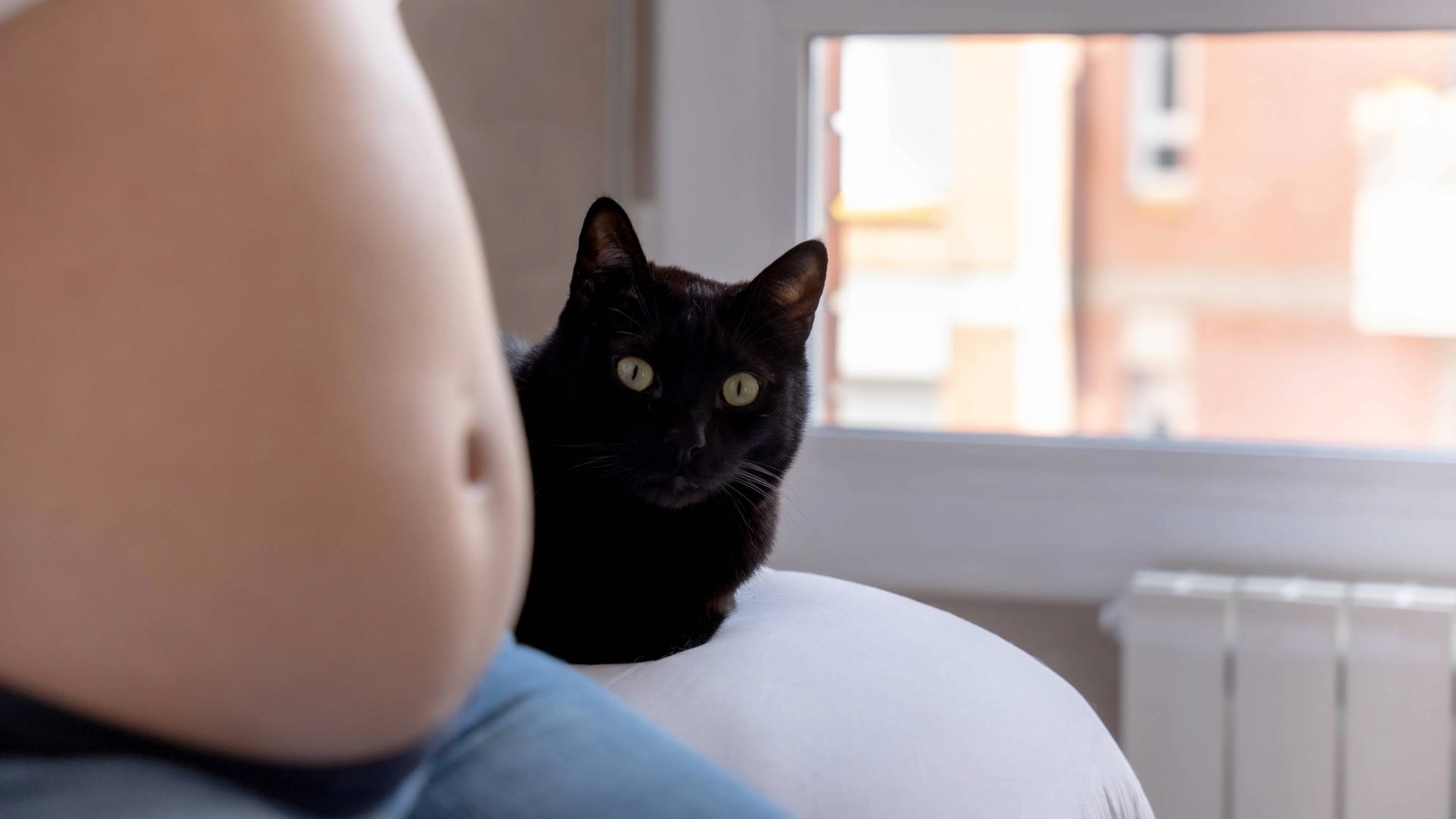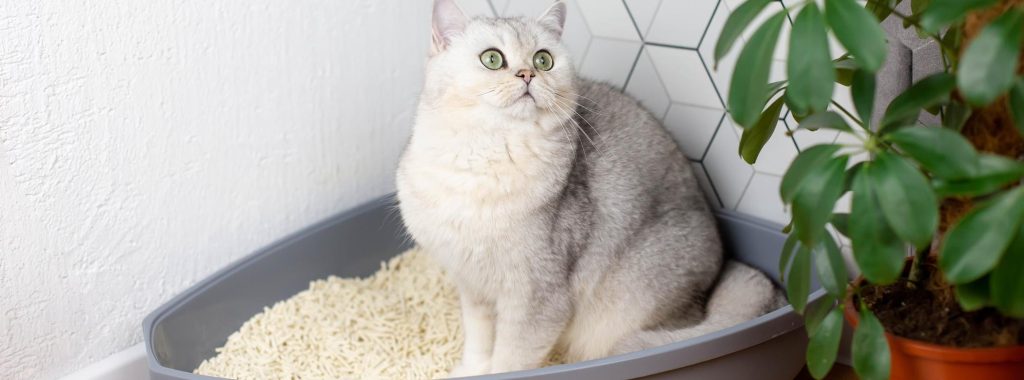If you’re pregnant, your health and your baby’s safety are your top priorities. But did you know that something as simple as cleaning your cat’s litter box could put you at risk?
Many expectant moms don’t realize how dangerous cat litter can be during pregnancy. You might wonder why a daily chore could suddenly become a threat. Keep reading to discover the hidden risks behind cat litter and what you can do to protect yourself and your little one.
This information could make all the difference for your peace of mind and your baby’s health.

Credit: www.petsradar.com
Toxoplasmosis And Pregnancy
Toxoplasmosis is an infection caused by a parasite called Toxoplasma gondii. Pregnant women face risks because this parasite can harm the unborn baby. Cat litter often contains the parasite’s eggs, making it a common source of infection.
How Toxoplasmosis Spreads
The parasite lives in cat feces and soil contaminated by infected cats. Pregnant women can catch it by:
- Handling cat litter without gloves
- Touching contaminated soil or sand
- Eating undercooked meat with the parasite
- Drinking contaminated water
Cleaning cat litter boxes daily helps reduce the risk, but avoiding it completely is safer during pregnancy.
Effects On The Fetus
The parasite can cross the placenta and infect the fetus. This infection can cause:
- Miscarriage or stillbirth
- Premature birth
- Brain damage
- Vision problems
- Hearing loss
- Developmental delays
Early diagnosis and treatment can reduce some risks, but prevention is the best approach.
Sources Of Infection In Cat Litter
Cat litter can carry harmful germs that pose risks to pregnant women. These infections come from parasites and bacteria living in cat waste. Understanding where these dangers hide helps keep both mother and baby safe.
Contamination Risks
Cat litter often contains Toxoplasma gondii, a parasite found in cat feces. This parasite causes toxoplasmosis, which can harm unborn babies. The parasite spreads through contact with contaminated litter or soil.
Other bacteria like Salmonella can also live in cat litter. These germs cause infections that lead to fever, stomach pain, and diarrhea. Pregnant women have weaker immune systems, making infections more dangerous.
Dirty litter boxes increase the chance of infection. The longer waste sits, the more germs grow. Handling litter without gloves or washing hands afterward raises contamination risks.
Handling Cat Litter Safely
- Wear disposable gloves when cleaning the litter box.
- Change the litter daily to reduce germ buildup.
- Wash hands thoroughly with soap and water after touching litter.
- Ask someone else to clean the litter box if possible.
- Keep the litter box in a well-ventilated area to minimize exposure.
Safe handling lowers infection chances. Simple habits protect health during pregnancy.
Symptoms To Watch For
Pregnant women should watch for symptoms related to cat litter exposure. The risk comes from a parasite called Toxoplasma gondii. This parasite can cause toxoplasmosis, which affects both mother and baby. Early detection of symptoms can prevent complications. Understanding what signs to watch for is crucial during pregnancy.
Signs In Pregnant Women
- Fever and chills
- Muscle aches and pains
- Headache that does not go away
- Swollen lymph nodes, especially in the neck
- Fatigue and weakness
- Loss of appetite
- Sore throat or flu-like symptoms
These symptoms may appear mild but can signal a serious infection.
When To Seek Medical Help
- If you experience any of the listed symptoms
- If you have been cleaning cat litter recently
- If you notice sudden swelling or pain
- If you feel unusually tired or weak
- If you develop a high fever over 101°F (38.3°C)
Contact your healthcare provider immediately for testing and treatment. Early care reduces risks to you and your baby.

Credit: www.thecattopia.com
Preventive Measures
Pregnant women face unique health risks from handling cat litter. Taking preventive measures can reduce these risks and keep both mother and baby safe. Careful handling and cleaning practices lower exposure to harmful germs. Simple changes in daily routine make a big difference.
Safe Litter Practices
Wear disposable gloves while cleaning the litter box. Wash hands thoroughly with soap and water after handling. Change the litter daily to prevent bacteria buildup. Use a mask to avoid breathing in dust or particles. Keep the litter box in a well-ventilated area. Avoid touching your face during the cleaning process. Clean the litter box with hot water and mild detergent regularly.
Alternatives To Handling Litter
- Ask a family member or friend to clean the litter box.
- Use self-cleaning litter boxes to reduce contact.
- Consider switching to low-dust, non-clumping litter types.
- Place multiple litter boxes around the house to spread out use.
- Use disposable liners to make cleaning easier and safer.
Other Health Concerns
Beyond the well-known risks of toxoplasmosis, cat litter poses other health concerns that pregnant women should be aware of. These issues can affect your comfort and well-being during pregnancy. Understanding these risks helps you make safer choices for you and your baby.
Respiratory Issues From Dust
Many cat litters create fine dust when poured or scooped. This dust can irritate your lungs and airways, especially if you already have asthma or respiratory sensitivities.
Imagine cleaning the litter box and suddenly coughing or feeling short of breath. This reaction happens because the dust particles enter your lungs, causing inflammation or discomfort. Pregnant women are often more sensitive to such irritants, which can worsen respiratory problems.
Choosing low-dust or dust-free litter can reduce this risk significantly. Also, wearing a mask while cleaning the litter box can protect your lungs. Have you considered these precautions to safeguard your breathing health?
Allergic Reactions
Cat litter can trigger allergic reactions in some people, with symptoms like sneezing, itchy eyes, or skin rashes. During pregnancy, your immune system changes, which might make you more prone to allergies than usual.
You might notice symptoms worsening after cleaning the litter box or being near the litter area. These reactions can be uncomfortable and stressful, which is the last thing you want while pregnant.
Switching to hypoallergenic litters or consulting your doctor about allergy management can make a big difference. How often do you experience allergy symptoms around your cat’s litter? Addressing this can improve your daily comfort.
Consulting Healthcare Providers
Pregnant women face unique health challenges, and one that often goes unnoticed is the risk posed by cat litter. Consulting healthcare providers is essential to understand these risks and take steps to protect both mother and baby. Your doctor can offer personalized advice based on your health history and lifestyle.
Testing And Diagnosis
If you have been exposed to cat litter, especially if you handle it regularly, your healthcare provider may recommend specific tests. One common concern is toxoplasmosis, a parasitic infection that can be transmitted through cat feces.
Simple blood tests can detect if you have been infected or if you have immunity. Early diagnosis allows for timely treatment, reducing risks to your pregnancy. Don’t hesitate to ask your provider about these tests, especially if you experience unusual symptoms like flu-like signs.
Recommended Precautions
Your healthcare provider will likely suggest practical ways to avoid exposure to harmful bacteria and parasites found in cat litter.
- Delegate the task of changing cat litter to someone else during pregnancy.
- If you must handle it, wear disposable gloves and wash your hands thoroughly afterward.
- Keep your cat indoors to reduce the chance of infection.
- Clean your cat’s litter box daily to prevent parasite growth.
Following these precautions can significantly lower your risk. Have you talked to your doctor about your pet care habits during pregnancy? It’s a conversation worth having to ensure your peace of mind and health.

Credit: twistedsifter.com
Frequently Asked Questions
Why Is Cat Litter Harmful To Pregnant Women?
Cat litter can contain Toxoplasma gondii, a parasite dangerous for pregnant women. It can cause toxoplasmosis, leading to serious fetal complications.
How Can Toxoplasmosis Affect Pregnancy?
Toxoplasmosis can cause miscarriage, stillbirth, or severe birth defects. It affects the baby’s brain and eye development significantly.
Can Pregnant Women Safely Clean Cat Litter?
Pregnant women should avoid cleaning cat litter. If unavoidable, wear gloves and wash hands thoroughly afterward to reduce infection risk.
What Are Safer Alternatives For Pregnant Women?
Pregnant women can ask others to clean litter or use self-cleaning litter boxes to minimize exposure to harmful parasites.
Conclusion
Cat litter poses risks for pregnant women. Toxoplasmosis can affect the unborn baby. It’s a serious concern. Avoid direct contact with cat litter. Wear gloves if necessary. Wash hands thoroughly afterward. Talk to your doctor for advice. Consider alternatives for cleaning the litter box.
It’s important to protect your health and your baby’s. Awareness and precautions make a difference. Stay safe and informed. Take the necessary steps now. Your health matters. So does your baby’s. Always prioritize safety and care.

